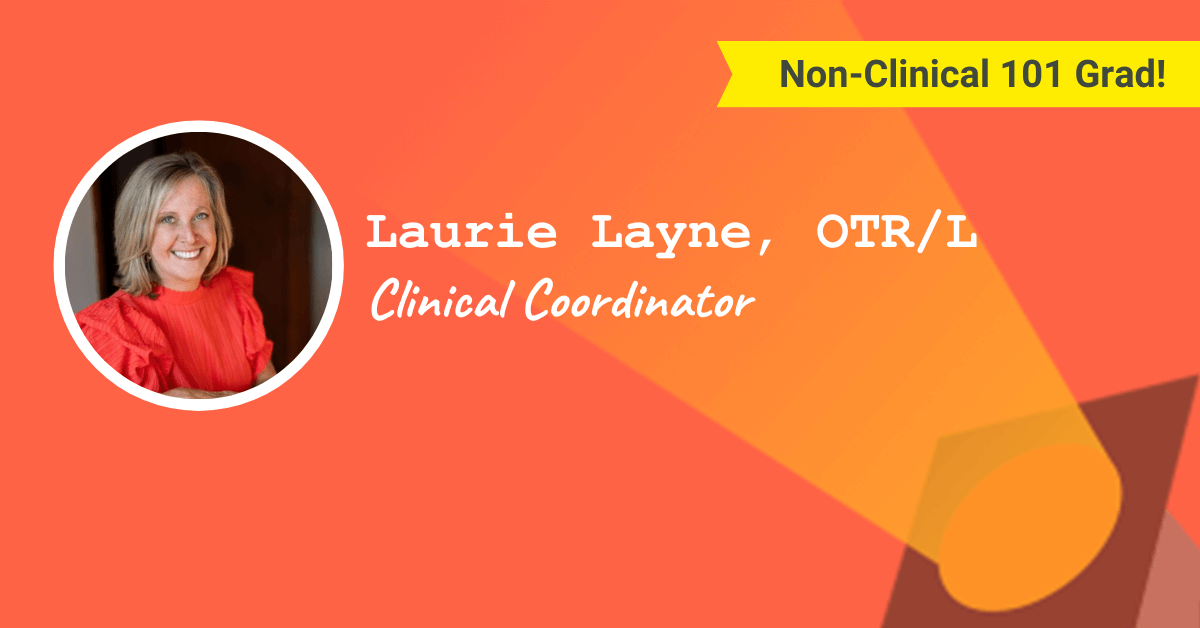This week’s spotlight is on Laurie Layne, OTR/L, a Non-Clinical 101 graduate who is now Clinical Coordinator for the Physician Assistant program at South University-Austin!
This post may contain affiliate links or codes. This won’t increase your cost, but it helps keep TNCPT alive, and free of annoying ads! Thank you for your support. 🙂
What is your full name, title, and company name for your current, primary role?
Laurie Layne, OTR/L — Clinical Coordinator for the Physician Assistant program at South University-Austin

Where are you located?
Austin, TX.
Where did you go to OT school, and what year did you graduate?
Texas Woman’s University-Houston, 1996.
Please refrain from contacting our spotlight participants on social media. There are thousands of readers just like you out there. 🙂 Please ask your questions in the comments on this blog post.
If you’re a Non-Clinical 101 student, you can network with many of our spotlight participants in the alumni groups!
What did you do when you first finished school, and for how long?
I worked as a civilian with the US military community in Europe for four years.
In what setting(s) did you work, and what types of patients did you treat?
While overseas, I first worked in an outpatient military clinic treating upper extremity injuries. I later transitioned to a pediatric setting that was split between early intervention and school-based therapy.
What did you enjoy about your early roles?
I loved getting out in the field, treating patients in their schools and homes, and witnessing their progress over time. I worked on a robust team of pediatric providers that included many disciplines (PT, ST, RN, educator, social worker, developmental pediatrician and psychologist).
Working collaboratively within that team taught me a lot about how healthcare professionals can support the patient and their families.
What else have you done since then, prior to your current role?
For many years, I worked as an outpatient pediatric therapist focused on feeding. I worked in both a hospital-based outpatient clinic and home health.
When and why did you decide to do something non-clinical?
Post COVID, I had the realization that the changes in healthcare would continue to become more challenging. The referred patients had more complex conditions and had often gone for long periods of time without any therapy.
Despite many hours of continuing education and taking on additional responsibilities, I began to feel stagnant in my job, and I saw that upward mobility as a therapist is limited.
I began listening to podcasts hosted by therapists who had transitioned to non-clinical roles and realized that we as therapists have many transferrable skills.
I was ready to explore a new sector of healthcare.
What are you doing these days?
In my current role as Clinical Coordinator, I am heavily involved in preceptor recruitment, training and retention. Every day is different, and my time can vary between:
- Marketing preceptorship to medical providers to ensure discipline-specific rotation availability
- Serving as a liaison between a clinical site and the PA program
- Scheduling students into their clinical rotations (40 students x 8 clinical rotations each year is akin to solving several puzzles at once!)
- Working with students to complete credentialing at their assigned sites
- Working collaboratively with our sister campuses
- Onboarding preceptors and conducting site visits
I also participate in the extensive student admission interview process and serve on the student progress and promotion committee.
Are you still treating patients, or are you solely non-clinical?
I am solely non-clinical; however, I am maintaining my license as it is a hard-earned, valuable asset.
How long have you been in your current role?
I have been in my current role since July 2024.
What do you wish you would’ve known before going into this role?
I have learned quite a few things along the way, but I think the key thing was recognizing and elevating the value of transferrable skills, such as communication and relationship building.
Did you get any special certifications or training along the way to help you get into your current role?
I am a Non-Clinical 101 graduate! Non-Clinical 101 was absolutely key to learning about the job possibilities for clinicians.
During that process, I also signed up for Evolve Your Success (EYS), which I discovered through Non-Clinical 101. Although I did not ultimately go into sales, EYS was fundamental in teaching me how to clarify my goals, network strategically and prepare for an interview. The mentors I had in EYS truly helped shape my new career chapter.
How did you find your job? Did you apply or find it through a connection?
I found it on LinkedIn and applied.
Did you do anything special to your resume and cover letter to land the job?
I revised my resume to reflect and highlight skills associated with the job description, and my cover letter was tailored to the specific role.
What was the interview like for the clinical coordinator role?
I first had a virtual interview with the Director of Clinical Education. That interview was followed by an in-person, three hour series of interviews with the faculty, staff, Program Director and the Associate Vice Chancellor of Academic Affairs.
I took time to study common interview questions and had completed a few mock interviews through EYS, which turned out to be enormously helpful.
What are some of the things you did to stand out, take initiative, and advance in your career?
I added responsibilities to my staff role while working in an outpatient setting, including becoming a feeding specialist who supported an affiliated pediatric gastroenterology clinic (which gave me insight into working directly with MDs) and managing OT and PT student placements for three hospital sites (which formed the basis of understanding the scope of my new role). I also joined a local women’s networking and leadership group and held leadership positions in several community organizations throughout the years leading up to my new role.
How have people reacted to you leaving patient care?
Across the board, people have been very supportive. Several therapists have contacted me to find out how I made the leap to non-clinical. Mentoring them has been both surprising and rewarding.
What’s a typical day or week in the life like for you? What types of tasks and responsibilities fill your time?
Every day is a little different! Some days, I am recruiting or onboarding new preceptors, meeting with the clinical team to slot students into rotations, maintaining our current database of preceptors and clinical sites, attending meetings, collaborating with students to complete credentialing for their assigned locations, or any combination thereof!
What are some of the rewards of your role? What are the biggest challenges?
There is a lot of autonomy with this role, which took some adjustment after having most every hour of every work day scheduled with patients! I have the freedom to prioritize my responsibilities, which has been wonderful.
Continuing to have an impact on healthcare and knowing that my work influences the path of future PAs is rewarding to me, and I have enjoyed working with PAs and seeing how their role fits into the healthcare landscape.
How did your clinical background prepare you for this role? Which skills transferred?
My clinical background prepared me well. Organization with meeting deadlines, an ability to communicate with a wide assortment of people, and the knack for building and maintaining positive working relationships with key stakeholders were instrumental.
Roughly speaking, how are the hours and pay compared to patient care?
The work-life balance has been worth the pay cut. I have energy left at the end of the day!
What type of person do you think would do well in your clinical coordinator role?
One would need to be detail-oriented, very organized and able to juggle competing demands.
Do you work remotely or onsite?
My role is hybrid. I am in the office most days, although I do go out to clinical sites for recruitment or to check in with current preceptors and students.
Does your organization hire PT, OT, or SLP professionals into non-clinical roles? If so, what type of roles?
Yes, as coordinators and as faculty for OTA and PTA programs.
Did you read any books, take any courses, or do anything special overall to get you where you are today?
Never Eat Alone by Keith Ferrazzi was recommended to me, and it opened my eyes to the power of networking. I also attended networking events and met 1:1 with local contacts.
What is a typical career path for someone in your clinical coordinator role?
Clinical coordinator paths can take a number of directions, depending on the requirements of the organization. In some places, coordinators can move up to senior roles with greater responsibilities.
What is next for you? What are your high-level career aspirations?
I am enjoying my current position and particularly appreciate both the educational and marketing aspects of my role. I find that I am drawn to roles that incorporate an aspect of teaching.
What would you recommend to someone who is considering going into a role like yours? Do you have any special words of wisdom for the readers?
Spend time researching what may be a good fit for you and get focused about the types of roles for which you are applying. Building a solid LinkedIn profile is crucial to driving the algorithm to find jobs that interest you. Networking is also very important!
What career advice would you give yourself that you wish you had during school?
Keep moving forward! Keep learning and growing, especially in areas that challenge you.
What would you teach to today’s graduate students in your profession, if you had the opportunity?
I would teach them basic business fundamentals. Healthcare (as a provider) is very different from the business side of things, but I believe the more the two entities can speak each other’s language, the better outcomes will be for patients.
Do you have any special advice for others who want to follow in your footsteps as a clinical coordinator?
Cultivate new skills by seeking out additional or new responsibilities in areas that interest you, and invest in supplemental courses.





